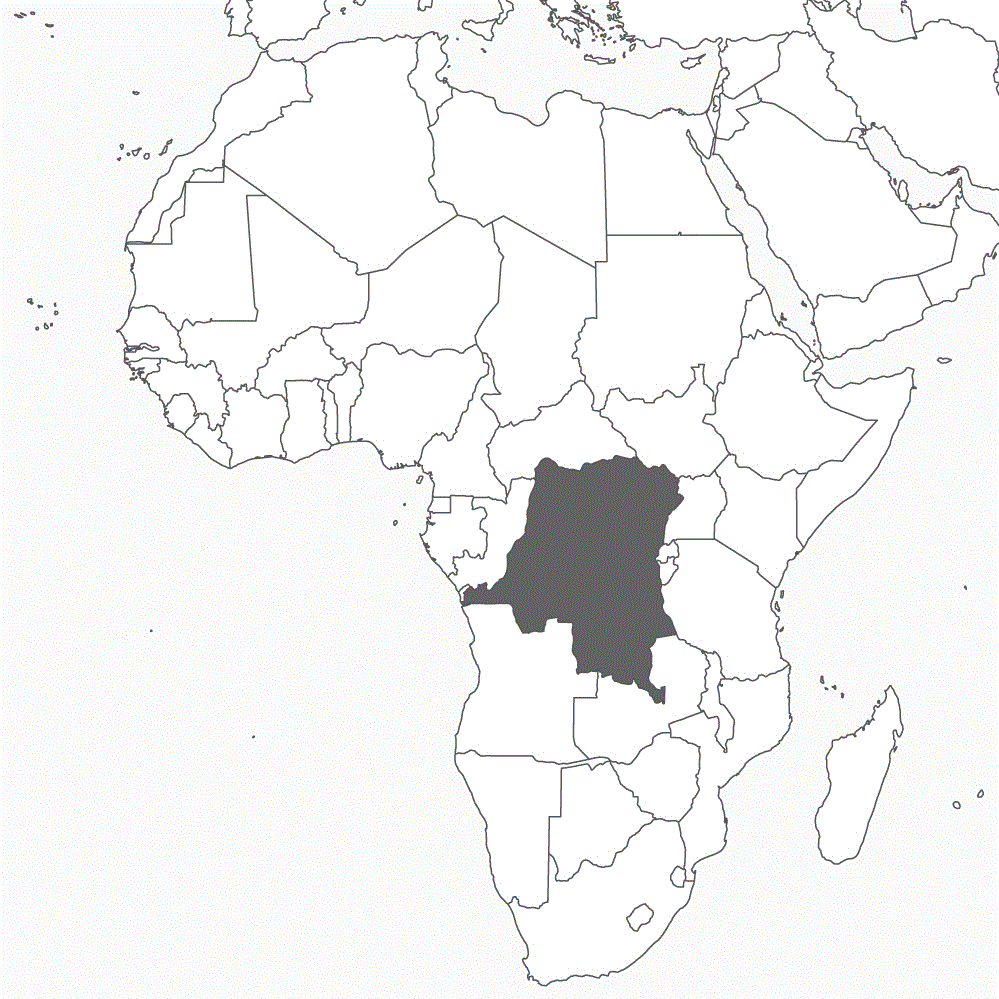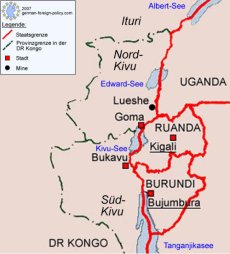Focal Partnership
GOMA/KIGALI/BERLIN (Own report) - Just one year after the deployment of German military in the Congo, Germany's close partner, Rwanda, is again involved in a military conflict with that country. With a militia of irregulars, Rwanda, one of the main recipients of so called German development aid, is involved in the power struggle in East Congo, a region rich in natural resources. Rwanda is supporting Congolese irregular troops, who have taken control of several regions rich in natural resources and refuse to demobilize. According to human rights organizations, they are recruiting large numbers of children and are using rape as a means of warfare. Nkunda's militia, accused of severe human rights violations, has close ties to Rwanda. Berlin nevertheless is expanding its aid to Rwanda. At the same time, a German enterprise announced its plans to resume the extraction of precious metals in the eastern Congolese war zone. This enterprise's activities in that region came under heavy criticism of the UN Security Council last year. The Security Council also criticized the German government's involvement in this affair, particularly concerning the activities of internationally wanted war criminals. This scandalous affair follows the logic of German policy in Central Africa: To secure its influence, Berlin is using its former colony Rwanda.
One year after German military ended their deployment, the situation in the Democratic Republic of Congo is again escalating. Last January, the army brutally  repressed protests in the western part of the country, resulting in 100 casualties. In March, heavy fighting erupted in the capital between the troops of Jean-Pierre Bemba, who had lost the elections, and army units of President Joseph Kabila. In August, armed conflicts escalated in eastern Congo. Following the wars in 1996/1997 and 1998 to 2003, current developments, according to observers, could lead to a third war. The situation is becoming particularly dangerous in North Kivu (see our map). This eastern Congolese province is rich in resources, whetting neighboring Rwanda's appetite for years. Supported by Berlin, Rwanda, itself poor in resources, has been trying to gain influence over the resources of North Kivu since the 1996 war.[1]
repressed protests in the western part of the country, resulting in 100 casualties. In March, heavy fighting erupted in the capital between the troops of Jean-Pierre Bemba, who had lost the elections, and army units of President Joseph Kabila. In August, armed conflicts escalated in eastern Congo. Following the wars in 1996/1997 and 1998 to 2003, current developments, according to observers, could lead to a third war. The situation is becoming particularly dangerous in North Kivu (see our map). This eastern Congolese province is rich in resources, whetting neighboring Rwanda's appetite for years. Supported by Berlin, Rwanda, itself poor in resources, has been trying to gain influence over the resources of North Kivu since the 1996 war.[1]
Upgraded
The German government closely cooperates with the Rwandan military regime, since it came to power following the 1994 genocide. One of the first Bundeswehr deployments in Africa was in support of this change of government. In April 1995, Germany became the first country to negotiate, what is called, development aid with the new government. And in 2001, just after Kigali had invaded East Congo to take control of the resources, the German Federal Ministry of Economic Cooperation upgraded Rwanda to make it its focal partner.[2] Rwanda is, still today, exporting - also to Germany - more natural resources than it possesses. Businessmen with close ties to Kigali are playing an important role and are particularly active in North Kivu, a Congolese mineral-rich province. German foreign ministry staff members have also been involved.[3] According to recent reports, a German enterprise is resuming its former activities in North Kivu.
Close to Rwanda
These activities are centered on the extraction of a rare mineral (pyrochlor), also essential for the aeronautic and space industries. The Lueshe mine (see our map) with its pyrochlor deposits had been German owned until it was expropriated in the late 1990s. During the post war confusion (German-foreign-policy.com reported extensively last year [4]) German businessmen - in cooperation with forces close to Rwanda - succeeded in maintaining control over the mine. German government agencies were also involved because of recourse claims stemming from former investment credits. The politically explosive nature of these disputes over property rights, became clear in early 2006 through a UN Security Council expertise. The UN concluded that the German party - including the German government - is playing an ominous role in eastern Congo. War criminals and their allied forces are also profiting from the German role. german-foreign-policy.com is documenting excerpts.[5]
Renewed Involvement
Last summer while the German foreign ministry was denying all involvement,[6] New York business agencies were reporting that the German side was intending to resume the extraction of resources from the Lueshe Mine.[7] Once again a North Kivu businessman is involved, whose cooperation with arms smugglers had been denounced last year by the United Nations. He is a contact person for the Rwandan president.[8] The former general, Laurent Nkunda, a militiaman who was also heavily criticized by the UN, has resurfaced. He has been capturing the attention of the international press because of his militias of irregulars in North Kivu. According to the UN, he runs a base, from time to time, in the Lueshe Mine, claimed by the government in Berlin. Today he is the most notorious warlord in all of East Congo. Human rights organizations accuse his troops of major crimes, including the systematic use of rape as a means of warfare and the recruitment of child soldiers - in Rwanda.
Personal State
Nkunda, a long time follower of the Rwandan president, intensified the combat missions of his militia following the elections in the summer of 2006. Through those elections, a partisan of Rwanda, who had been in power in North Kivu, had to step down. Since then, Nkunda has been increasing the territory under his control through military force. As Human Rights Watch learned from Nkunda's soldiers, they are now in control of their own "personal state".[9] Large segments of the region of the Lueshe Mine are within its borders.[10] According to reports, that is exactly where the German "Gesellschaft for Elektrometallurgie (GfE, Nuremberg) intends to resume business.
Increase
The German government is maintaining its close cooperation with the government in Kigali, in spite of the growing international criticism of the brutality of Rwanda's eastern Congolese allies. German Minister Heidemarie Wieczorek-Zeul declared already three years ago that demands to cancel German development aide to Rwanda, because of its implication in the Congolese war, are "completely wrong".[11] Her ministry granted Kigali another 24.5 million Euros in June. Included in this sum is also what is known as "budgetary aid," whose usage is more difficult to trace than other development aid funds. The foreign ministry declared that this budgetary item will be "significantly increased in the coming year."[12]
Exception
The developments are following the logic of German Central Africa policy, using its former colony Rwanda to maintain its influence. Rwanda is useful, not only because it offers auxiliary forces for military interventions, for example in Sudan. But because Rwanda is also pursuing its own power ambitions in the Congo and is being supported by businessmen as well as militiamen like Nkunda. Last year, the Bundeswehr did not intervene as these militias were preparing their current offensive. The EU troops had a mandate for the Democratic Republic of Congo - with the exception of the two Rwanda bordering Kivu provinces.
Please read also The Lueshe Mine.
[1] see also They are ready, Interview with Dr. Helmut Strizek, Haftbefehle and Mit Rebellen gegen Khartum
[2] see also They are ready
[3] see also War Resources (III)
[4] see also War Resources (I), Kriegsressourcen (II) and War Resources (III)
[5] see also The Lueshe Mine
[6] Schriftliche Fragen mit den in der Woche vom 19. Juni 2006 eingegangenen Antworten der Bundesregierung; Deutscher Bundestag, Drucksache 16/1934, 23.06.2006
[7] Congo's Only Niobium Producer Plans to Restart Mining; Bloomberg.com 20.11.2007
[8] Es handelt sich um den Geschäftsmann Mode Makabuza, der als Vertreter der deutschen Gesellschaft für Elektrometallurgie (GfE, Nürnberg) auftritt. See also Ein doppeltes Spiel
[9] Human Rights Watch: Renewed Crisis in North Kivu; Oktober 2007
[10] Es handelt sich um die Region Rutshuru. Human Rights Watch: Renewed Crisis in North Kivu; Oktober 2007
[11] "Wir sollten regionale Kooperation stärken"; taz 06.11.2004
[12] Beziehungen zwischen Deutschland und Ruanda; Länder- und Reiseinformationen des Auswärtigen Amts

